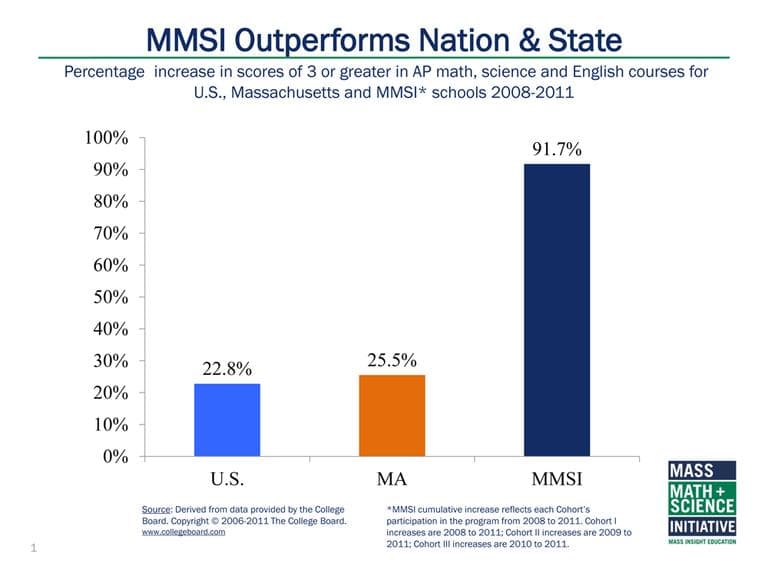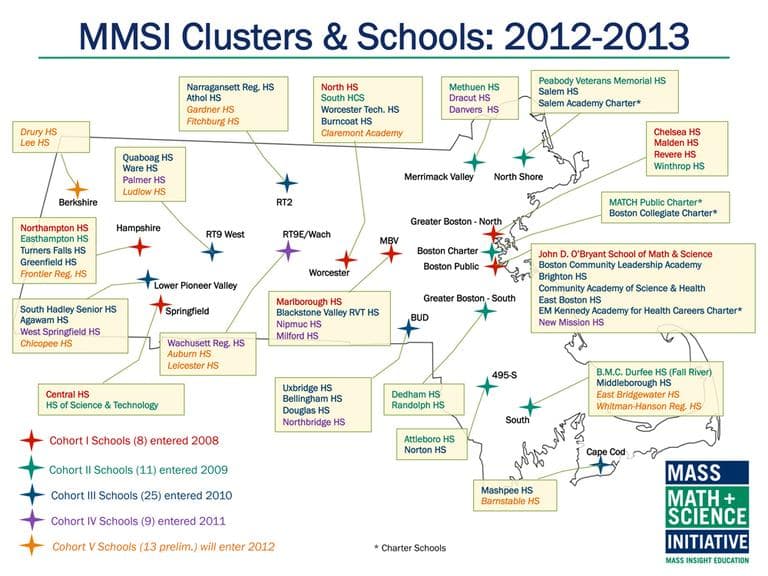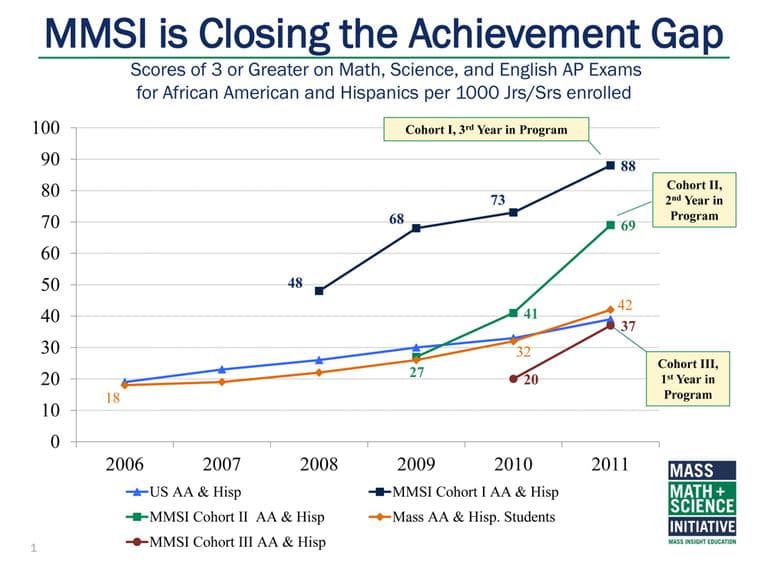Advertisement
Under Initiative, More Students Flourish In AP Courses
Resume
Since 2008, a program in Massachusetts has more than doubled the number of high school students who receive college credit-eligible scores on Advanced Placement math, science and English exams, and has also been successful in attracting more minority students to AP courses.
Traditionally, AP classes are an elite program for students who are expected to do well on the tests. The usual suspects, says Mort Orlov, president of the Mass. Math and Science Initiative, which administers the program. He calls it the "Casablanca strategy."

"The tendency when we go into a school and say, 'Look, we want to expand access to Advance Placement in math, science and English courses,' the immediate calculation is, 'How do I get Monica in my class because I know she’s a sure bet?' We refer to that as the 'Casablanca strategy,' or rounding up the usual suspects because you can count on them."
But Orlov and others believe many more students in urban schools would benefit from rigorous AP classes, so the privately funded program works to expand access in Massachusetts and five other states. The program uses PSAT scores to identify mid- to high-preforming students who have been overlooked. These students tend to be low-income, minority students.
Now, Nora Tsoutsis is teaching 11th-grade AP English to 25 students, all minorities, at the John O’Bryant School in Roxbury.
While the room is crowded, the students are engaged. Among them is 16-year-old John Paul, who never really tried hard before this class.
"You’re with people who want to learn and who push you to learn so it’s not like the class where you can relax and just chill," John Paul said. "It's where you have to get down and stick your nose into the books, like flip the pages and put in actual effort."
Tsoutsis says John Paul is a good example of what an AP class can do for a mediocre student.
Our schools are demonstrating ... that you can drill down into the middle of the class, pick up kids who traditionally might not have been recruited into AP courses, and provide the support for them to succeed.
Bill Guenther, CEO of Mass. Insight Education
"It’s been really interesting to see him during the course of the year just because he’s really pushing himself now," Tsoutsis said, "taking his thinking to the next level. He’s excited."
John Paul predicts he’ll get a five on his AP exam, but Tsoutsis says it doesn’t matter if he scores a four or five and gets college credit. She has different expectations.
"The conversation that we have is, 'Are you stronger than when you came in? Have you pushed yourself? Have you seen growth?' " Tsoutsis said. "And if you’ve seen growth then you’re better as a result of the class, that’s OK."
The program has doubled the number of students in AP classes in the participating 53 high schools in Massachusetts. The African-American and Hispanic students in the courses produced 51 percent of the state’s increase in passing scores on AP exams.
Bill Guenther, the CEO of Mass. Insight Education, which oversees the program, says this shows that the program is closing the achievement gap.
"Our schools are demonstrating, with our support, that you can drill down into the middle of the class, pick up kids who traditionally might not have been recruited into AP courses, and provide the support for them to succeed," Guenther said.
That support includes extra pay for teachers and Saturday study sessions that students are enticed to attend with raffles for prizes like iPads. Even with the incentives, schools and teachers are hesitant to take on lower-performing kids in AP classes, which typically have only 5 percent of juniors and seniors.
But John Travers, head of the guidance department at Brighton High School, says teachers see that even if the students don’t earn high enough scores to get college credits, they are better prepared for college.

"They’ll say they always thought we were making up stories about how hard college was and the rigor that was there," Travers said. "But they come back at Thanksgiving and say, 'It's just what you said. I really am reading 50 to 60 pages a night. I really am studying 1 to 2 hours a night. But I’m getting Bs and As in all my classes.' "
There’s been little pushback to the program in urban schools, but some worry that it will dilute the experience for higher-level students.
That hasn’t been the case, says Orlov, the program’s president. He’s confident even more low-income and minority students can rise to the challenge.
"I know that we can double the numbers again," Orlove said. "I know that we can triple the number of kids in calculus being successful in this state and that has to have an impact on our ability to support our valued industries and ultimately to support our communities."
The private funding for the Mass. Math and Science Initiative is ending next year. The program is pursuing more private support and asking the Legislature to commit approximately $3 million in order to maintain and expand AP classes to 12 more schools on the waiting list.
This program aired on May 14, 2012.